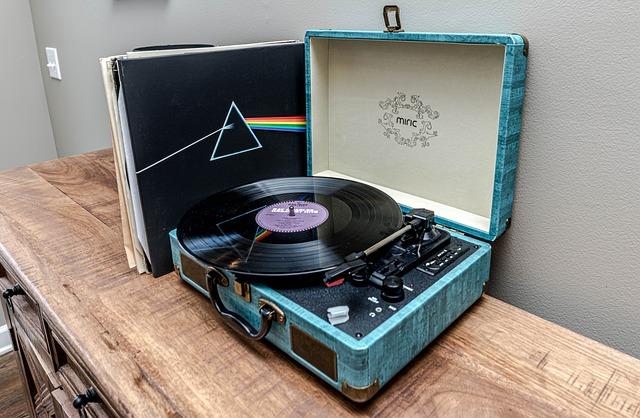There’s always something magical about the warm, nostalgic sound of a vinyl record spinning on your turntable.
For many of us, listening to vinyl records feels like stepping into a time machine and reliving the golden era of music. A lot of people still prefer vinyl records over digital tracks because of their nostalgic appeal.
But let’s face it – as much as we adore these vintage gems, vinyl records do need some extra care to stay in their prime. Without proper care, your favorite tunes can easily get damaged.
Here are some useful tips to take care of your vinyl records so that they keep producing those sweet tunes for years on end.

1. Keep Your Hands Clean While Touching the Records
Before you even lay a finger on your precious vinyl, make sure your hands are squeaky clean and free of any oils or dirt. Our skin secretes oils that can leave greasy fingerprints on the record’s surface, which is a big no-no.
These prints might seem harmless, but they can degrade the audio quality and cause the vinyl records to crackle, which even leads to permanent damage. So, always wash your hands before handling your precious records, and when you do, hold them by the edges or the inner label.
Also Read: Best Sounding Vinyl Records of All Time
2. Store Records Upright and Away from Heat
Most of us make the mistake of stacking up our vinyl records which is not the ideal way of storing them. Vinyl records are meant to be stored upright, like books on a shelf.
Stacking them horizontally can sometimes lead to warping, and that’s a nightmare for any vinyl enthusiast. It’s because warping alters the shape of the record and makes it unplayable.
To avoid this, you can create a space in your bookshelf and store your records with your books. Storing them vertically distributes the weight evenly and reduces the risk of warping.
Moreover, it’s essential to keep your collection away from direct sunlight and heat sources like radiators. High temperatures can permanently damage your precious vinyl in a matter of hours. We suggest finding a dry place that can protect your vinyl from various environmental hazards.
3. Use Anti-Static Inner Sleeves
Static electricity is like that annoying cousin who always shows up uninvited. In fact, static electricity can be a vinyl record’s worst enemy as it attracts dust and debris like a magnet. Typical paper sleeves can cause static buildup, which sometimes distorts the sound quality of the vinyl.
To solve this problem, we recommend using anti-static inner sleeves. Opt for ones made of polyethylene or polypropylene. These sleeves protect your vinyl from static and dust while preventing scratches and scuffs.
4. Clean Your Vinyl Records Regularly
You should also be aware that a dusty record heavily affects the sound quality of your turntable while also damaging its needle.
But no matter how cautious you are, your best-sounding vinyl records will inevitably accumulate dust and grime over time. So, to keep them protected from dust, regular cleaning is the only solution.
Use a carbon fiber brush before each play to remove surface dust. If you want to be more thorough, you can also use a record cleaning kit or a vinyl vacuum cleaner. While cleaning, use a circular motion to ensure that the grooves are properly cleansed.
5. Be Gentle with the Turntable Needle
The turntable needle is the delicate component that is responsible for reading the grooves on your vinyl. So to get the authentic sound, you also have to take good care of it.
For instance, don’t drop the needle forcefully like a hammer onto the record or touch it with your fingers. Instead, use the cueing lever to lower the needle gently onto the starting point of the track. Plus, you can also replace the old needle or stylus if you want to maintain the best audio quality.
6. Turntable Setup and Calibration
A properly set up turntable will give you an optimal playback experience and reduces wear on your vinyl records. In contrast, a poorly set-up turntable can lead to all sorts of issues, from poor sound quality to excessive wear on your vinyl.
So, make sure your turntable is level and placed on a stable surface. Incorrect tracking force can lead to excessive wear on your records and cause skipping.
So, you must calibrate the tracking force according to the manufacturer’s recommendations to ensure the right amount of pressure on the grooves. A well-calibrated turntable means happy vinyl and even happier ears!
7. Avoid Automatic Return Features
Even though automatic return turntables might seem convenient, they often cause damage to your vinyl records.
The automatic arm lifting and returning mechanism can be harsh on the record surface and increase the risk of scratches. It’s always better to use a manual turntable where you can lift the arm gently when the record ends.
If you desperately want modern technology in your vinyl record, you can use a turntable with semi-automatic features.
8. Never Stack Records on the Turntable
Most of us stack our vinyl albums on top of each other on the turntable so that we listen to our favorite music one by one.
But please, resist the urge to stack them like a tower on your turntable. The added weight can put unnecessary pressure on the records at the bottom, which causes warping and scuffing.
Play one record at a time and store the rest properly in their sleeves. This way, your vinyl records and turntable will last longer.
9. Don’t Touch the Record While It’s Playing
It may be tempting to fiddle with the record while it’s spinning, but this can significantly damage the vinyl.
Touching the surface of the record while it’s in motion not only affects the sound quality but can also cause irreversible damage.
Let the record play undisturbed and save your interaction for when you’re cleaning or handling it with care.
10. Keep the Records Away from Magnetic Fields
Magnetic fields can interfere with the delicate grooves of your vinyl records and distort the sound quality. So, keep your records away from speakers, amplifiers, or any other electronic devices that generate magnetic fields.
If you’re concerned about magnetic interference, put them in anti-static inner sleeves for an extra layer of protection from magnetic fields.
11. Avoid Paper and Cardboard Storage
While we adore those cool album covers made of cardboard or paper, they can be a double-edged sword for our vinyl records.
Some of the cardboard materials contain acids that can leach into the vinyl, causing it to degrade over time. You can avoid this type of disaster by placing your vinyl records in separate plastic outer sleeves and storing them separately from the album covers.
12. Monitor Humidity Levels
To keep your favorite vinyl records in pristine condition, you also have to check the humidity level of your storage area. It’s because high humidity levels can lead to mold growth on your vinyl, while low humidity can make the records brittle.
An ideal humidity level for vinyl is considered to be around 40-50%, so try to maintain a stable humidity level in your storage. If you live in an area with extreme humidity swings, using a dehumidifier or humidifier can be your vinyl’s best friend.
Also, opt for a climate-controlled environment to protect your vinyl from extreme temperature changes so they remain as cool as ever.
13. Be Cautious with Picture Discs
Picture discs are like pieces of art, they look stunning, and they also have good value in the market. But beware, these vinyls often require special care due to their unique manufacturing process.
Picture discs have a layer of printed graphics on the playing surface, making them more susceptible to wear and damage. So, you must handle them with extra care to maintain their visual and audio appeal.
14. Handle Warped Vinyl with Caution
Despite all your best efforts, a vinyl record might warp sometimes due to unforeseen circumstances. If you encounter a warped record, you might be able to repair it by handling it with extreme care.
First, place the vinyl between two sheets of glass and then lay it in direct sunlight for a few hours. The heat from the sun might be able to flatten the record and make it playable again.
However, this method may not always work, and it’s essential to accept that some records may be irreparably damaged.
Also Read: Developing Good Practice Habits on a Digital Piano
Conclusion
Taking care of your vinyl records doesn’t require a great effort, but it does demand a little mindfulness and attention to detail. With these above-mentioned tips, your vinyl records will not only last longer but will also continue to bring joy and nostalgia to your life.
Each record is a unique piece of musical history, and by treating them right, you keep their timeless melodies intact for generations to come.



